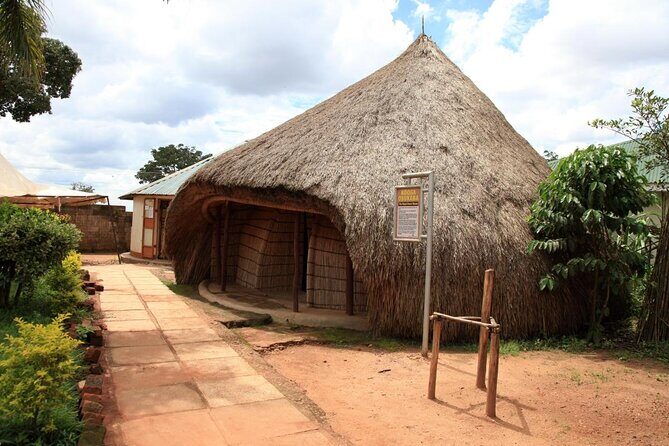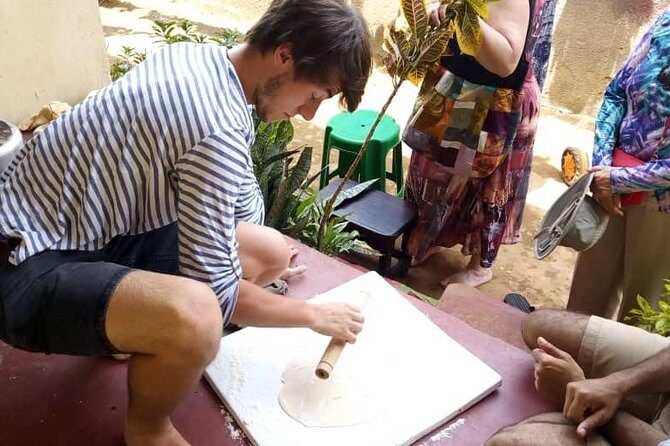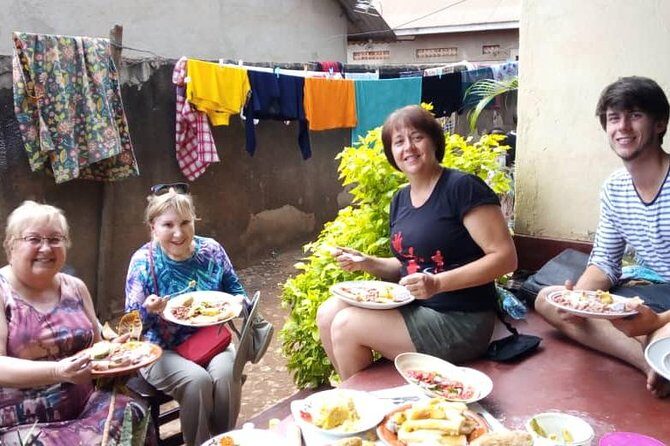If you’re looking to explore Uganda’s culinary culture beyond just tasting, this cooking class in Kampala offers a hands-on experience that’s both fun and educational. It’s perfect for travelers who want to learn how to recreate traditional Ugandan dishes back home or simply enjoy a unique cultural activity that goes beyond typical sightseeing.
What makes this experience stand out? First, the small group size—capped at just 10 participants—ensures an intimate, personalized atmosphere. Second, it’s centered around vegetarian recipes, which is great if you’re vegetarian or just curious about plant-based Ugandan cuisine. And third, the delicious meal at the end, based on authentic recipes, is a highlight you’ll likely be talking about long after the class ends.
One thing to keep in mind: the activity is weather-dependent, so if rain or other conditions interfere, a reschedule or refund is possible. This class appeals most to adventurous food lovers, curious travelers, or anyone wanting a meaningful, local experience in Kampala.
- Key Points
- A Detailed Look at the Ugandan Cooking Experience
- What to Expect from the Class
- The Itinerary Breakdown
- The Authentic Recipes
- The Meal and Atmosphere
- Why the Price Is Justified
- The Reviews Speak for Themselves
- Practical Details
- The Sum Up: Who Is This Experience Best For?
- FAQ
- More Safari Adventures in Kampala
- More Tours in Kampala
- More Tour Reviews in Kampala
- Still browsing? Here are more Kampala experiences we've covered recently
Key Points

- Authentic culinary insight into Ugandan vegetarian dishes
- Small-group format ensures personalized attention
- Learn from knowledgeable hosts who share local plant uses and cooking tips
- Enjoy a sit-down meal of the dishes you prepare together
- Affordable price point at $32 per person for a 4-hour experience
- Ideal for cultural travelers seeking meaningful, hands-on activities
A Detailed Look at the Ugandan Cooking Experience
Feeling inspired to cook? Check out these other hands-on experiences in Kampala
What to Expect from the Class
This half-day cooking workshop in Kampala is designed for small groups, capped at 10 participants, which significantly enhances the experience. The session begins with a warm welcome from Gertrude, the host, who not only teaches the cooking but also shares stories about native plants used in everyday life, including the fascinating use of banana leaves.
Throughout the class, you’ll get a hands-on role—peeling yams, slicing plantains, and preparing ingredients like cassava and pumpkin. These local ingredients are staples in Ugandan cuisine, and Gertrude makes sure everyone understands how to process and cook them properly. This type of participation makes the experience more engaging and memorable.
The Itinerary Breakdown
The class starts at Steve Residence in Nansana, an accessible location near public transportation, making it convenient for travelers to join. The focus is on vegetarian dishes, especially staples like matooke (steamed or boiled plantains) and G-Nut sauce, which reviewers have raved about as some of the best local flavors.
You’ll learn how to peel, cook, and season these ingredients, often in traditional ways, such as using banana leaves for steaming or wrapping. Gertrude’s explanations reveal a rich knowledge of native plants and their culinary uses, making this class more than just a cooking lesson—it’s an insight into local life.
The Authentic Recipes
Expect to prepare dishes that are vegetarian, relying on fresh produce and simple techniques. Reviewers highlight the G-Nut sauce as a particular favorite, noting how flavorful and authentic it tastes. The dishes aren’t overly complicated but require a little patience and attention to detail—perfect for those who want to understand the basics of Ugandan cooking.
The Meal and Atmosphere
After cooking, everyone sits down together to enjoy the fruits of their labor. The atmosphere is friendly and informal, with conversations flowing smoothly. One reviewer mentioned chatting, dancing, and sharing stories with Gertrude and her son, which adds a personal touch to the experience.
The meal is described as delicious and satisfying, giving you a true taste of local flavors. The views from Gertrude’s home offer a bonus, providing a lovely backdrop while you eat, and making for excellent photo opportunities.
Here are more experiences we've reviewed in Kampala
Why the Price Is Justified
At $32 per person for four hours, this experience offers excellent value. You’re not just paying for a meal but for an immersive cultural activity—learning traditional recipes, understanding native plants, and sharing a meal with local hosts. The intimate group size ensures plenty of individual attention, which enhances your learning and enjoyment.
The Reviews Speak for Themselves
With a perfect 5.0 rating from 25 reviews, it’s clear that travelers find this class rewarding. Dinah_P describes Gertrude as a “wonderful and sweet host,” highlighting how she shares her knowledge and makes everyone feel at home. The same reviewer notes the traditional process of peeling and processing native plants, including the use of banana leaves, which adds educational value.
James_T calls it an “authentic Ugandan experience,” emphasizing how much he enjoyed the food and Gertrude’s hospitality. Many reviewers also mention the deliciousness of the dishes, particularly the G-Nut sauce, which consistently impresses visitors.
Practical Details
The tour operates near public transportation, making it accessible for most travelers. The duration of approximately 4 hours means you get enough time to cook, chat, and enjoy the meal without feeling rushed.
Booking is typically done about 8 days in advance, and cancellation is free up to 24 hours before the activity, offering flexibility for travelers concerned about weather or schedule changes. The class is suitable for those interested in authentic cooking, cultural exchange, or simply trying something different in Kampala.
The Sum Up: Who Is This Experience Best For?

This Ugandan cooking class offers more than just a cooking lesson; it’s a window into everyday life and local food traditions. If you love hands-on experiences and want to learn how to make authentic, native dishes in a relaxed environment, you’ll find this class a perfect fit. It’s especially valuable for vegetarians or those curious about plant-based local cuisine.
Travelers seeking a meaningful cultural activity that combines learning, eating, and socializing will appreciate the small-group setting and knowledgeable hosts. The affordability and the genuine warmth of Gertrude and her family make this a memorable addition to any Kampala itinerary.
However, if you prefer guided city tours or hardcore culinary techniques, this might feel too relaxed. Also, as weather can impact outdoor activities, it’s wise to consider the local forecast when booking.
This small-group cooking experience provides a delicious taste of Uganda’s culinary soul, perfectly suited for curious, friendly travelers eager to connect with local culture through food.
FAQ

What is the starting point for this tour?
The class begins at Steve Residence in Nansana, which is accessible via public transportation.
How long does the experience last?
The activity takes approximately 4 hours, from start to finish.
What kinds of dishes will we learn to cook?
You’ll focus on typical Ugandan vegetarian dishes, including staples like matooke and G-Nut sauce.
Is the class suitable for vegetarians?
Yes, the class is entirely vegetarian, emphasizing plant-based Ugandan recipes.
How many people participate in each class?
Groups are capped at 10 travelers for a more personalized experience.
Can I cancel if my plans change?
Yes, free cancellation is available up to 24 hours before the activity.
Do I need to bring anything?
No special equipment is needed; everything is provided. Just wear comfortable clothes suitable for cooking.
Are dietary restrictions accommodated?
The class focuses on vegetarian recipes; other dietary needs aren’t specified but can be checked with the provider.
Is transportation provided to the meeting point?
Transportation isn’t included, but the location is near public transit options.
What do travelers say about the host?
Reviews highlight Gertrude as a “wonderful and sweet host,” knowledgeable about native plants and cooking techniques, making everyone feel welcome.
To sum it up, this Kampala cooking class is a highly authentic, affordable, and engaging way to connect with Ugandan culture. Perfect for food lovers, curious travelers, and anyone wanting a warm, personal introduction to local life—this experience is genuinely worth the time.
More Safari Adventures in Kampala
More Tours in Kampala
More Tour Reviews in Kampala
- Kampala: Traditional Wedding Experience with Food and Drinks
- 1 Day Kampala city tour Uganda
- Kampala Sunset and Night Tour – Customizable
- Uganda: 4-Day Bwindi Impenetrable Forest National Park Tour
- Uganda: 10-Day Customized Wildlife and Primates Safari
- Kampala: Guided City Walking Tour with Gadaffi Mosque
Still browsing? Here are more Kampala experiences we've covered recently
- Kampala: Traditional Wedding Experience with Food and Drinks
- 1 Day Kampala city tour Uganda
- Kampala Sunset and Night Tour – Customizable
- Uganda: 4-Day Bwindi Impenetrable Forest National Park Tour
- Uganda: 10-Day Customized Wildlife and Primates Safari
- Kampala: Guided City Walking Tour with Gadaffi Mosque
- Kampala: City Guided walking sightseeing Tour
- Kampala: City Guided Walking Tour with Kabaka`s Palace
- Jinja: Two-Day Rafting, Horse Riding, Quad Biking Adventure
- Boda boda/Motorbike Tours in Kampala, Uganda
- Kampala city tour expererience
- Kampala: 3-Day Murchison Falls Safari
